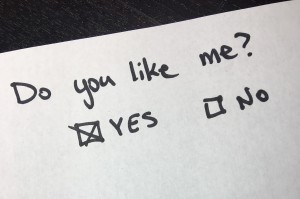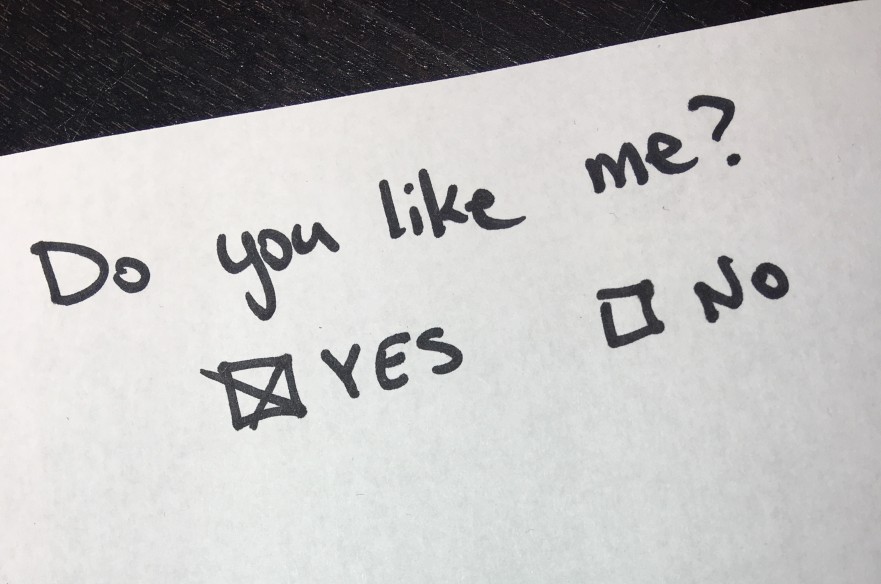There is a sign on the door of my classroom that says “I <3 My Students” (with an actual heart). It is cut out in the shape of a heart and made on sunset colored poster board. I made it for the day we welcomed our students back to class after last year’s teacher walkout in Arizona. It’s a sincere sign. I have decided that if I don’t love my students, it will make life as a teacher a lot less satisfying and a lot more stressful. But I didn’t always have this wisdom, though it comes naturally for some. And, to this day, I have to admit that I struggle to like some of my students.
That sounds horrible. I told my 7th grade daughter I was going to write about the professional practice of liking my students, and she immediately assumed that this meant that I must hate some of them, and she advised me not to write about that. So let me clarify: I don’t hate any of my students. I actually hate very few people in the world. It takes an awful lot of energy I can use for something else, like making time for naps.
Let me back up. Once upon a time, I worked in a district with very high family engagement, and some very “challenging” parents*. I was also much less experienced, and one of my personal qualities is that I very much enjoy being right. This is a quality I have learned to temper– most of the time…. Well, much of the time…. Well, in parent meetings. Needless to say, being a young teacher who likes to be right, with a need to assert her authority in the classroom, in meetings with demanding parents often created longer and more strident meetings than were absolutely necessary. In fact, I probably owe some administrators a few apologies for that. (I’m sorry.)
During these meetings, one weapon in what I then perceived as the parental arsenal was a particular line of reasoning that began with “I think there might be a personality conflict….” That line really got me going. “Nope, no personality conflict here! I am simply asking this student to ________ and he/she refuses to ________ and responds by ________. Definitely NOT a personality conflict. I just need him/her to _________.” No matter how much this teenager knew exactly which button of mine to push and when, and no matter how inept I was at de-escalating the situation (because I hadn’t really learned that yet), I felt offended when someone implied that I would allow something as petty as personality differences to influence my disciplinary decisions in class. It literally insulted me and put me into high defensive mode.
Eventually I learned to stop this silliness: Of course there are personality conflicts between me and some students. Of course. It would be silly to try to deny it!
The real question is what we do with the knowledge that we may have trouble liking certain students on a day to day basis.
Here’s what I do. I rely on my very uneven Christian influences of visiting all my friends’ churches as a kid, attending Vacation Bible School one summer, and going to church with my wonderful grandparents on holidays. Oh, and reading a children’s book of bible stories at the age of 11, probably at least three times. The values I was taught (by these sources, and by the actions and words of my mother and father) were that showing love to others is a choice we make on a daily basis, love such as forgiveness, compassion, suspension of judgment, patience, generosity, helpfulness and kind words and actions. I can also show love by the belief that my students can learn to make good choices and to achieve highly. I can do these things on most days for any of my students. This outlook is a choice, and I have found that this professional practice gets easier with practice, like any habitual action or thinking.
Because I always strive to act in a loving way toward my students, I can easily admit to parents, and even at times to students, when we have personality conflicts. I can admit it because despite those conflicts there are a multitude of ways in which I can show the student that I care and am committed to their success. When I approach things that way, I actually like my students a lot better. I am less likely to label them as lazy, difficult or disrespectful without trying to find out more.
Do I still become irritable and short-tempered sometimes? Absolutely. I am only human. Are there still times that I throw up my hands and put the problem onto someone else’s desk? Fewer than before. And I really do enjoy parent meetings.
*I am also going to admit right here that since I have had my own kids, I have had days when I have been the challenging parent, and then some. Just ask my son’s 8th grade English teacher about our days-long email exchange in which I critiqued her grading system at length. Poor woman. She chose really great literature for them to read, though, so you know… we are still Facebook friends.










Comments 3
Thank you for sharing so openly a very difficult topic and one not many are willing to be so candid about.
I figure I have nothing to lose! I suppose a lot of teachers naturally have the emotional intelligence to navigate these waters from Day 1, but it was a bit of a journey for me as an early career teacher.
Great discussion about how we relate to our students. I completely agree. Caring is a choice. I can choose to look past the things that grate on my nerves and see someone as a human with frailties and strengths, or I can assume every action is about proving me wrong….it’s my choice. I too had to figure this out over time. I found out that my own insecurities and fear that I was not really cut out for teaching is what fueled most of the conflicts I experienced with students. Of course, I didn’t realize this until I was confident in my abilities and my mind calmed down enough to process things rationally. You show the teacher leader attribute of vulnerability well….may it work to strengthen our profession!